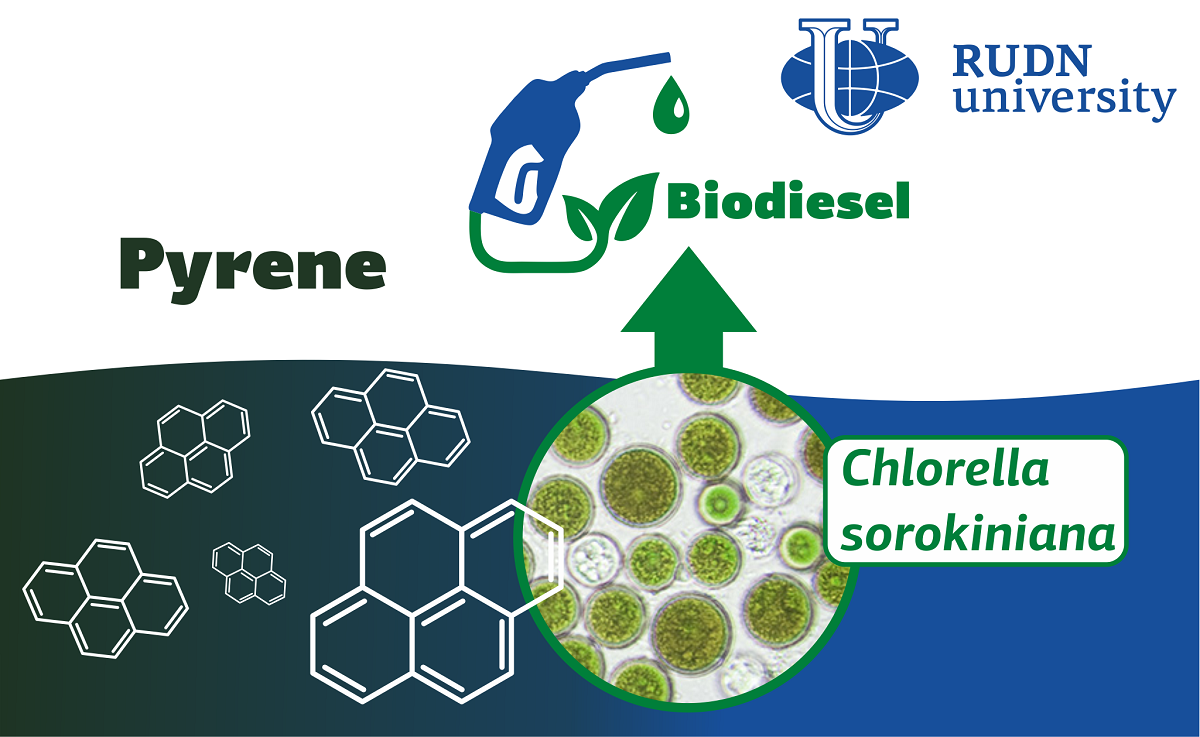RUDN University сhemist: microalgae help purify water and synthesize biofuels
Pyrene is a cyclic organic compound forming in combustion processes, for example, in the internal combustion engine of a car. This is one of the most common anthropogenic pollutants. One of the methods of cleaning the environment from pyrene is bioremediation, cleaning with the help of plants, fungi and animals. RUDN University chemist together with colleagues from India, Russia and South Africa have shown that water purification from pyrene with microalgae not only helps to get rid of harmful pollutants, but also to get eco-friendly biofuels.
“Pyrene is an anthropogenic organic pollutant prevalent in various ecological units, it receives more attention for bioremediation and energy transformation using microalgae. Microalgae lipids have a great potential for the production of biofuels. And chemical stressors stimulate an increase in the content of lipids in cells. This is the mechanism of microalgae adaptation to stress,” said Vinod Kumar, RUDN University professor.
Chemists have studied the metabolism of Chlorella sorokiniana algae under the effect of pyrene. For 16 days, the algae were grown in a pyrene-contaminated environment and in a clean environment. The lipids that the algae produced during this time were then converted into biofuels.
Too high a concentration of pyrene (0.05%) almost completely destroyed microalgae. At a concentration of 0.023%, 50% of the algae cells survived, and they showed high resistance to the pollutant. During the experiment, algae from contaminated water gained almost as much weight as algae from water without pyrene — 444 mg per liter versus 449 mg. The composition of algae from the pyrene medium has less protein, but 21.2% more carbohydrates and 24.5% more lipids. The composition of these lipids is suitable for the synthesis of biofuels — the conversion efficiency was about 81%.
“This investigation reveals the promising potential of the oleaginous microalgae C. sorokiniana for the bioremediation of pyrene in conjunction with the induction of cellular lipids for biofuels. Furthermore, the exploitation of lipids is not a limited product either, but rather reopens the enticements of biofuels from de-oiled biomass by hydrothermal liquefaction, pyrolysis, etc. In addition to these, various value-added products (such as carbohydrates, proteins, pigments, vitamins, etc.) as well as fertilizers are also potentially possible applications. Therefore, this research work demonstrates diverse application potential for further research and application opportunities,” said Vinod Kumar, RUDN University professor.
The results are published in Chemosphere.
The RUDN Prize for Scientific Achievements in Chemistry for 2025, with a monetary award of 2 million rubles, was awarded to Alexander Davidovich Dilman, Deputy Director of the N.D. Zelinsky Institute of Organic Chemistry of the Russian Academy of Sciences. The researcher received the award during the celebration marking RUDN’s 66th anniversary.
Sergey Ivanov, a scholar from St. Petersburg, has been named the first winner of RUDN University’s International Prize for Scientific Achievements in Mathematics, worth 5 million rubles.
Products derived from microalgae represent a cutting-edge development in the field of bioeconomy. The potential of this biological resource was discussed at the international research seminar “Foundations for a Green Sustainable Energy”, part of the BRICS Network University’s thematic group on “Energy”. The event was organized by the Institute of Ecology at RUDN University.
